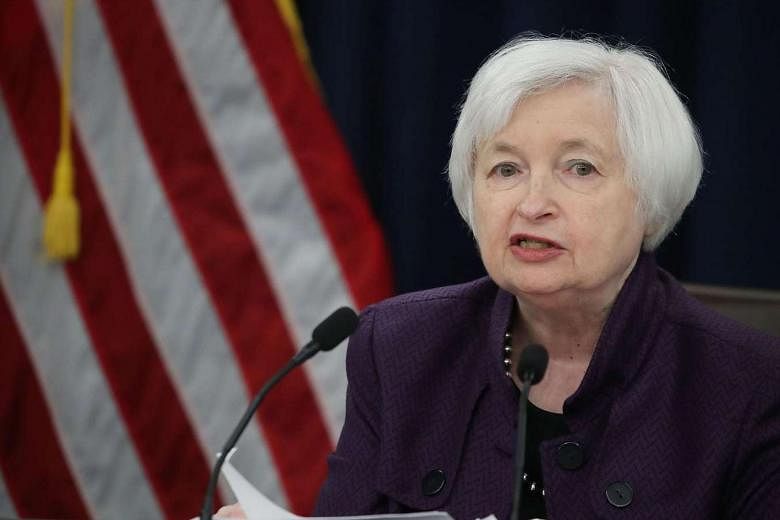SINGAPORE - I have only just managed to regain my footing after a whirlwind trip across north-eastern China earlier this month to catch the early autumn colours which left me quite exhausted.
While I was away, Wall Street succumbed to a swoon with all the three major US indexes posting their biggest losses since Brexit in July on fears that the US central bank would hike interest rates.
As it turned out, the US Fed, chaired by Janet Yellen, didn't hike rates after its meeting ended on Wednesday (Sept 21), even though the divisions had deepened, with three of their policy-makers voting against the decision to hold rates steady.
I was in the coastal city of Dandong, which faces the North Korean border two weeks ago, when I read the morning news about Wall Street's plunge. The local Chinese TV station was then showing a programme about the Sept 11 terrorist attacks on New York city 15 years ago.
How uncanny, I thought to myself, that the latest roller-coaster in stock prices should coincide with one of the biggest plunge in Wall Street in recent times.
Well, the yell mode was back in the world's financial markets this morning after the Fed's decision. Asian markets are up after their US counterparts jumped, with the Nasdaq hitting a new high.
The Fed announcement came just hours after after the Bank of Japan announced a monetary easing strategy aimed at managing the yield curve - flagging that there would be no let-up in the efforts among the world's central banks to fight any slowdown in growth in the global economy.
Not that I was expecting an imminent US rates hike two weeks ago when I was reading about the convulsions on Wall Street. As I see it, the Fed is unlikely to do anything controversial before the highly-charged US presidential election in November - and this would include a rates hike less than 50 days away before US voters cast their votes.
And with the Fed's next meeting just days before the Nov 8 election, we can safely assume that US interest rates would remain as they are until its final meeting on Dec 13-14.
Still, one question to be raised is why financial markets should fear a US interest rates hike so much, despite the jubilation encountered today.
After all, even if US interest rates are raised by a quarter-point to 0.5 per cent, that is still a significantly lower borrowing cost, compared to what companies were used to before the global financial crisis eight years ago.
One concern is that Wall Street continues to make gains this year, despite the so-called earnings recession among giant US companies. For the past six quarters, US earnings have fallen. Under such inauspicious circumstances, Wall Street shouldn't be partying away.
But what is supporting US stock prices at their current gravity-defying levels is US companies buying back their shares in a big way, taking advantage of the cheap money made available by the ultra-low interest rates environment to issue new debts.
This process of swapping debt for equity by borrowing to buy back stock effectively reduces the number of shares of a company in circulation while adding debt to its balance sheet.
Now, what happens when interest rates go up? It does not take a rocket scientist to realise that the company will be squeezed at both ends - a further squeeze in profit as the woes of falling business revenues are compounded by a heavier debt burden.
This may, in turn, force companies to scale back on their buy-back binge which has been responsible for much of Wall Street's gains this year. Ditto to any further upside on Wall Street in that case.
For the Singapore stock market, I see a further problem which will cap any upside which the Straits Times Index is likely to enjoy for now.
Banks make up a significant portion of the STI. But there is no denying the fact that Singapore, which the local lenders still derive a big part of earnings, is suffering from anaemic growth.
Add to this the woes which the formerly dynamic oil and gas sector is experiencing, in which all three lenders do have quite a sizeable exposure, as oil prices languish at their lowest levels since 2009.
As a UOB Kay Hian report early this month points out, banks faces risks from a further deterioration in asset quality from the oil and gas sector.
It makes for grim reading to find the brokerage's analysts observing that at DBS' and OCBC's current share prices, the market is anticipating the two lenders' non-performing loans ratio for the oil and gas sector to hit around 40 to 50 per cent, and valuation for collaterals to decline by up to a massive 70 to 80 per cent.
Given the important role which the oil and gas sector plays in our economy and the large number of workers it employs, there will, no doubt, be some knock-on effects on the broader economy if such a worst case scenario plays out.
So enjoy the stock rally while it lasts. As one of my remisier friends likes to sign off on his e-mail - the only good day was yesterday.


